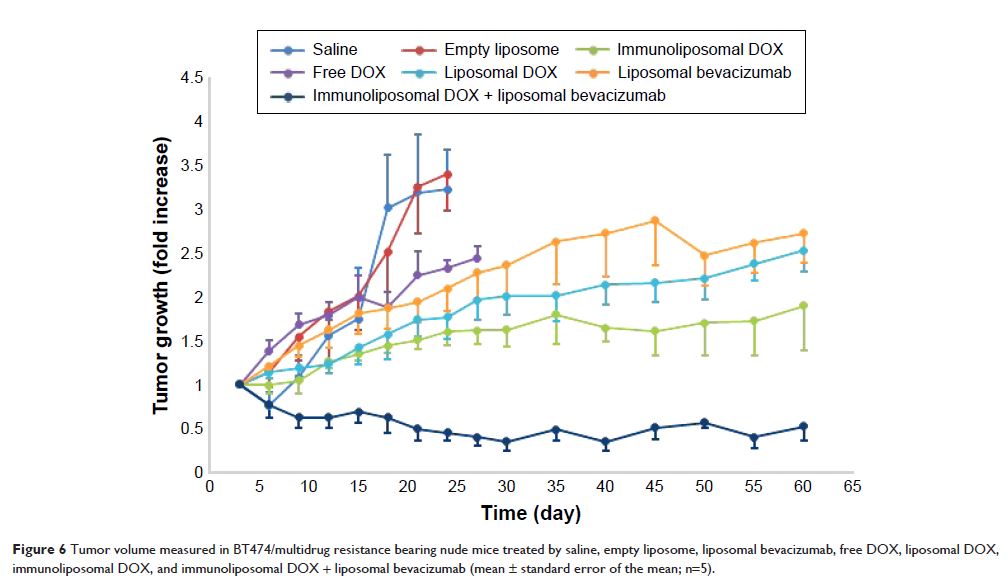109568
论文已发表
注册即可获取德孚的最新动态
IF 收录期刊
- 3.4 Breast Cancer (Dove Med Press)
- 3.2 Clin Epidemiol
- 2.6 Cancer Manag Res
- 2.9 Infect Drug Resist
- 3.7 Clin Interv Aging
- 5.1 Drug Des Dev Ther
- 3.1 Int J Chronic Obstr
- 6.6 Int J Nanomed
- 2.6 Int J Women's Health
- 2.9 Neuropsych Dis Treat
- 2.8 OncoTargets Ther
- 2.0 Patient Prefer Adher
- 2.2 Ther Clin Risk Manag
- 2.5 J Pain Res
- 3.0 Diabet Metab Synd Ob
- 3.2 Psychol Res Behav Ma
- 3.4 Nat Sci Sleep
- 1.8 Pharmgenomics Pers Med
- 2.0 Risk Manag Healthc Policy
- 4.1 J Inflamm Res
- 2.0 Int J Gen Med
- 3.4 J Hepatocell Carcinoma
- 3.0 J Asthma Allergy
- 2.2 Clin Cosmet Investig Dermatol
- 2.4 J Multidiscip Healthc

Targeted multidrug delivery system to overcome chemoresistance in breast cancer
Authors Tang Y, Soroush F, Tong Z, Kiani MF, Wang B
Received 15 October 2016
Accepted for publication 14 December 2016
Published 21 January 2017 Volume 2017:12 Pages 671—681
DOI https://doi.org/10.2147/IJN.S124770
Checked for plagiarism Yes
Review by Single-blind
Peer reviewers approved by Dr Alexander Kharlamov
Peer reviewer comments 3
Editor who approved publication: Dr Thomas J. Webster
Abstract: Chemotherapy has been widely used in breast cancer patients to reduce
tumor size. However, most anticancer agents cannot differentiate between
cancerous and normal cells, resulting in severe systemic toxicity. In addition,
acquired drug resistance during the chemotherapy treatment further decreases
treatment efficacy. With the proper treatment strategy, nanodrug carriers, such
as liposomes/immunoliposomes, may be able to reduce undesired side effects of
chemotherapy, to overcome the acquired multidrug resistance, and to further improve
the treatment efficacy. In this study, a novel combinational targeted drug
delivery system was developed by encapsulating antiangiogenesis drug
bevacizumab into liposomes and encapsulating chemotherapy drug doxorubicin
(DOX) into immunoliposomes where the human epidermal growth factor receptor 2
(HER2) antibody was used as a targeting ligand. This novel combinational system
was tested in vitro using a HER2 positive and multidrug resistant breast cancer
cell line (BT-474/MDR), and in vivo using a xenograft mouse tumor model. In
vitro cell culture experiments show that immunoliposome delivery led to a high
cell nucleus accumulation of DOX, whereas free DOX was observed mostly near the
cell membrane and in cytoplasm due to the action of P-gp. Combining liposomal
bevacizumab with immunoliposomal DOX achieved the best tumor growth inhibition
and the lowest toxicity. Tumor size decreased steadily within a 60-day
observation period indicating a potential synergistic effect between DOX and
bevacizumab through the targeted delivery. Our findings clearly indicate that
tumor growth was significantly delayed in the combinational liposomal drug
delivery group. This novel combinational therapy has great potential for the
treatment of patients with HER2/MDR double positive breast cancer.
Keywords: immunoliposome, targeted drug
delivery, xenograft mouse tumor model, combination therapy, multidrug
resistance
